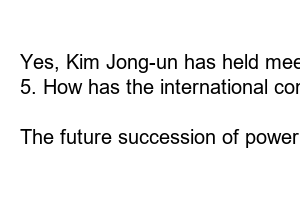김정은
Title: Unmasking Kim Jong-un: A Look into North Korea’s Supreme Leader
Introduction:
North Korea’s Supreme Leader, Kim Jong-un, is a figure that captivates the world with curiosity and fascination. From his distinctive hairstyle to his authoritarian rule, Kim Jong-un has dominated headlines and piqued the interest of individuals worldwide. In this blog post, we delve into the enigmatic life and reign of Kim Jong-un, unveiling the man behind the iron curtain.
1. The Rise of a Leader: Kim Jong-un’s Journey to Power
As the youngest son of former North Korean dictator Kim Jong-il, Kim Jong-un’s ascent to power was marked by secrecy and intrigue. His grooming as the successor began early on, leading him to become the country’s Supreme Leader in 2011. Despite his relative anonymity at first, Kim Jong-un has since solidified his position and cultivated a distinct image of leadership.
2. Cult of Personality: Kim Jong-un’s Propagation of His Image
Kim Jong-un’s leadership is centered around the establishment of a cult of personality, where his authority is unchallenged and revered by the North Korean population. By carefully curating his public image through propaganda, elaborate ceremonies, and staged events, he is successfully perpetuating the notion of his infallibility and greatness.
3. Nuclear Ambitions: Kim Jong-un’s Pursuit of Power
One of the most alarming aspects of Kim Jong-un’s regime is his relentless pursuit of nuclear weapons. Through strategic missile tests and provocative gestures, North Korea under his leadership has become a significant global concern. The international community has repeatedly condemned his actions, leading to heightened tension and calls for denuclearization.
4. Human Rights Abuses: The Dark Side of Kim Jong-un’s Rule
While Kim Jong-un presents a confident and authoritative facade, his regime is marred by severe human rights abuses. Reports of political repression, forced labor camps, limited freedom of speech, and oppression of religious and LGBTQ+ communities reveal a darker side to his leadership, one that demands attention and action from the global community.
5. International Relations: Kim Jong-un on the World Stage
Kim Jong-un’s international relations have been marked by a series of diplomatic efforts and summits. With high-profile meetings involving prominent world leaders, including Donald Trump and Moon Jae-in, he has sought to bolster North Korea’s position on the global stage. However, these efforts have been met with skepticism and limited progress toward peace and stability.
6. Succession and the Future of North Korea
As speculation about Kim Jong-un’s health and potential successors continues, the question of what lies ahead for North Korea remains unanswered. The eventual transition of power will have significant implications for the country’s future direction and its relationships with the international community.
Summary:
Kim Jong-un’s enigmatic persona, marked by his rise to power, cult of personality, nuclear ambitions, human rights abuses, international relations, and the future of North Korea, has created a remarkable narrative that continues to capture the attention of the world. Though his reign has been characterized by controversy, it serves as a reminder that understanding individuals in power requires a careful examination of both their public image and the realities hidden behind closed doors.
FAQs:
1. Is Kim Jong-un related to Kim Jong-il?
Yes, Kim Jong-un is the son of Kim Jong-il, the former dictator of North Korea.
2. How long has Kim Jong-un been in power?
Kim Jong-un assumed power in 2011 after the death of his father, Kim Jong-il.
3. What is the significance of Kim Jong-un’s distinctive hairstyle?
Kim Jong-un’s hairstyle is widely emulated in North Korea as a symbol of loyalty to their leader.
4. Has Kim Jong-un met with any world leaders?
Yes, Kim Jong-un has held meetings with numerous world leaders, including Donald Trump and Moon Jae-in.
5. How has the international community responded to Kim Jong-un’s nuclear ambitions?
The international community has expressed concern and condemnation over North Korea’s pursuit of nuclear weapons, resulting in sanctions and diplomatic efforts.
6. What is the likelihood of a successful transition of power in North Korea?
The future succession of power in North Korea remains uncertain, raising questions about the country’s stability and relationships with other nations.

